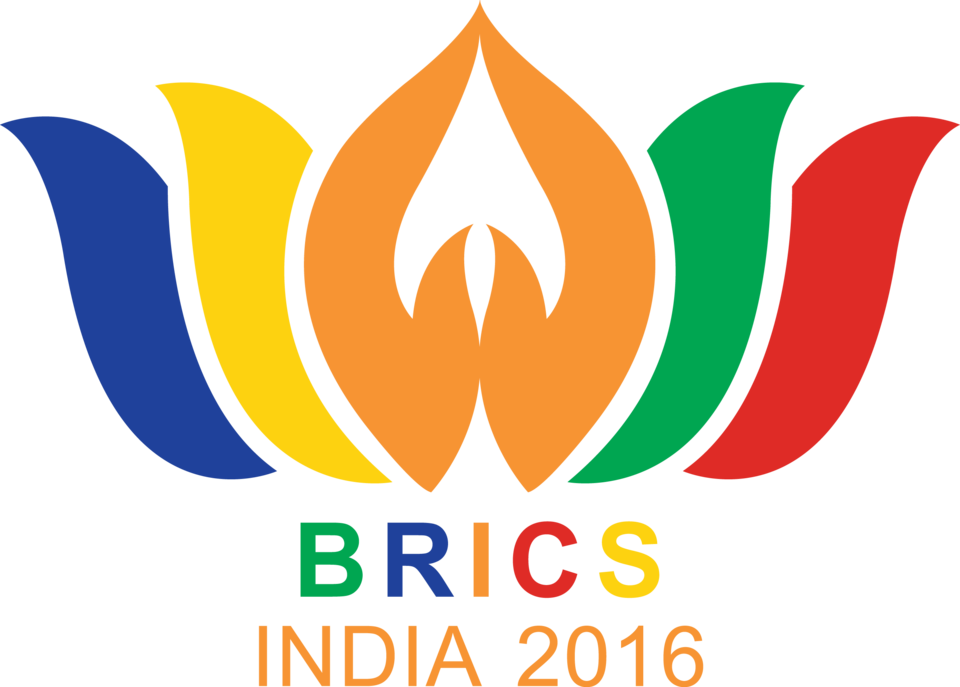
Logo of the upcoming BRICS Summit in Goa, in October 2016
———–
Book review: BRICS: A Very Short Introduction. By Andrew F. Cooper. Oxford University Press, 2016. 144 pages. $7.67 (kindle, amazon.com)
Considering how significant the BRICS grouping has become for international politics, it is remarkable how few books there are on the subject. A quick search for “BRICS” on amazon still leads mostly to expensive suitcases and handbags, while analyses on emerging powers only appear on the following pages. The majority of books about the BRICS are written by economists who assess their future growth potential, without taking the political dimension into account. Those that do take the political aspects into considerations speak mostly to academic readers, not the general observer in search of a broad overview. In this context, Cooper’s very short introduction on the BRICS grouping indeed fills an important niche, providing a solid overview which can be read in a few hours and includes all the basic information. As the BRICS grouping is moving into its most interesting phase — that of consolidation and institutionalization — demand for BRICS-related analyses is set to grow.
Contrary to most work produced by US academics or policy makers on the subject, Cooper offers a balanced view of the grouping. He acknowledges that mainstream observers have failed to take the BRICS seriously, yet he also says defining the group remains a challenge. He says the BRICS are “moving beyond past models”, suggesting that one should not try to find historical analogies to the grouping. It may be unavoidable that one very common but ultimately empty criticism appears early on in the book: the argument that the BRICS are too different and thus should not form a club. Paradoxically, the most common example is size: China’s economy is bigger than that of all the other BRICS countries combined, so China should not be part of the grouping, the argument (by Harvard Graham Allison, among others) goes. This overlooks that common economic size plays absolutely no role in assuring successful cooperation — as the G7, which consists of member countries with very different economies — shows. Who would ever argue that the US should leave the G7 because it is much bigger than the rest? In this particular case, as in a few others, Cooper could have gone beyond a rather neutral stance and call out the lack of logic in Allison’s reasoning. In the same way, when comparing the BRICS grouping to the G7, Cooper points to many intra-BRICS rivalries, but does not mention that there are many squabbles between G7 members as well. Germany and Italy, for example, are fundamentally opposed when it comes to UN Security Council reform, yet that does not lead analysts to question the G7.
BRICS: A Very Short Introduction includes an analysis of the multitude of intra-BRICS meetings that now take place throughout the year. This is laudable, as the vast majority of commentators never bother to analyze them in detail. In his analysis, Cooper says that despite a proliferation of activities including society representatives, the meetings “did not alter the basic relationship between state and society concern the operation of the summits.” While that is true — the summits are a purely state-centric affair — he may be setting the bar unfairly high. After all, which other informal gathering, such as the G7 or the G20, was able to seriously include the voices of non-state actors?
Even those who view the BRICS favorably will agree, however, with Cooper’s point that despite all the rhetoric, BRICS member countries not necessarily see the grouping as a key strategic priority: The sherpas indicated by each country usually do not have the political clout their counterparts at the G20 possess. It is equally surprising to see how few diplomats countries like Brazil or South Africa assign to work exclusively on BRICS-related issues.
Above all, however, Cooper strikes a reassuring note to worried readers in Washington: “There is little evidence”, he says, “that the BRICS members are committed to any revisionist collective action that would challenge the fundamental character of the post-1945 system.” Rather, the focus so far has been on hedging and institutional maintenance rather than ‘hard balancing’. Considering the benefits the BRICS derive from the status quo, that is unlikely to change soon.
In the end, the author — rightly, I believe — explains why the BRICS grouping will live on, even though growth rates are no longer as high as they used to be. It is precisely the looseness in form that bestows the BRICS its staying power, he argues. Indeed, it would be unrealistic for five five major countries, located in different regions of the world, each with their own complexities, to impose binding rules on each other. Still, Cooper says, “although the transformative effect of the BRICS can be overblown, both its symbolic and operational role in the diffusion of authority in the 21st century global system should not be underestimated.”
Read also:
The BRICS: Seeking Privileges by Constructing and Running Multilateral Institutions
“The BRICS and the Future of Global Order” by Oliver Stuenkel
Why Brazil Shouldn’t Turn Its Back on the BRICS (Americas Quarterly)








